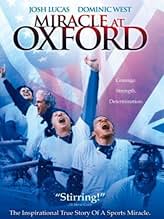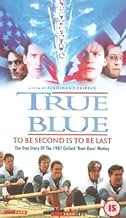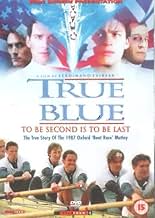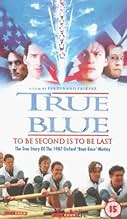Adicionar um enredo no seu idiomaThe story of the year the Oxford and Cambridge boat race changed from a gentleman's race to one where winning was everything.The story of the year the Oxford and Cambridge boat race changed from a gentleman's race to one where winning was everything.The story of the year the Oxford and Cambridge boat race changed from a gentleman's race to one where winning was everything.
- Direção
- Roteiristas
- Artistas
Robert T. Bogue
- Jeff Chambers
- (as Robert Bogue)
- Direção
- Roteiristas
- Elenco e equipe completos
- Produção, bilheteria e muito mais no IMDbPro
Avaliações em destaque
Taking it's lead from the true story of the 1986 Oxford-Cambridge boat race, 'True Blue' is an attempt to convert this seemingly inconsequential event into a meaningful experience. The film fails because the relevance is only apparent to those with an interest in the subject, or those directly involved. Sure, there's an all encompassing metaphor for our ability to overcome obstacles in our path, and fight against the odds, but for that you would be better off with 'Rocky', or 'Chariots Of Fire' (which this film shamelessly rips off on more than one occasion). I don't doubt that all those involved were deeply passionate about the real story here, the people who made the victory so convincingly their own, but the film flounders due to some erratic performances, and some banal dialogue - not to mention an incredible anti-American streak throughout. It's a peculiarly English film, like the boat race itself, that will appeal to those with a vested interest and no-one else.
Rowing is a lot harder and satisfactory than running, and not only because of the physics, but also because of the team building style that can pre-eminently make or break a winning team. 'True Blue' is not a 'Chariots of fire' with it's David Watkin (Catch-22) cinematography and Vangelis (Blade Runner) score, but as I like rowing a lot better than running, this was a good film for me, especially because I started rowing in 1996. The film is not only appealing for the English or Americans, but also for the Dutch. The reason for that might be the Dutch victory in the 1996 Olympic Boat Race (and remember: no points for second place). These 'Holland Acht' guys must have seen this film the day before.
Another good point of this movie is the absence of religious interference with the urge to perform, and the presence of struggle for influence between coaches and rowers. Apart from the infighting that's what is concerning rowers most. 'War is not about who's right, but about who's left (in the boat)'. 'True blue' is definitely more than a simple tv-movie for rowers. Credit to cinematographer Brian Tufano (Shallow Grave, Trainspotting, Quadrophenia, Lords of discipline).
Accordingly, I have to rate both movies 8/10
Another good point of this movie is the absence of religious interference with the urge to perform, and the presence of struggle for influence between coaches and rowers. Apart from the infighting that's what is concerning rowers most. 'War is not about who's right, but about who's left (in the boat)'. 'True blue' is definitely more than a simple tv-movie for rowers. Credit to cinematographer Brian Tufano (Shallow Grave, Trainspotting, Quadrophenia, Lords of discipline).
Accordingly, I have to rate both movies 8/10
I do not wish to contradict or to differ with any pundits on the cinematography of this movie and most certainly I have no wish to disagree with the views of fellow brothers of the blade.... yet there is an aesthetic side to this movie.
Rowing, especially highly competitive rowing steeped in tradition, is a concept that can be understood only by those who have actually tasted the bitter gourd of defeat in a race and savoured its hard won victories. That is the essential of this movie.
Indeed the mistakes are fallacious, and sometimes appalling pathetic, especially for those who know their blade work. However despite the blatant technical errors so obvious to a trained eye, as a story that inspires, this fills a much needed void.
As a coxswain, its slightly different to the ones portrayed in the movie. Contrary to popular belief, in some parts of the world where there are traditional races like the Ox-Bridge where old rivals train eleven months of the year for just a single course down, we're not just dead weights in the boat. We actually have to do all the fitness that guys a foot taller and twice our weight have to do, only on one meal a day for weight reasons. Basically everything, ergo, weights, runs etc... except the water training. I found that the camaraderie that I shared with my crews, a thing all coxes will agree with me, was sadly missing in this movie. The 'coxing' in the final race was rather timid to say the least. Although I do confess, in the absence of something better this was a good phyche-up movie to watch before the races.
What I did like about the movie is what it showed. The politics and the desperation to win is universal in every crew. The characters, heroes, villains and bystander can be related to by any oarsman. The best and most profound scene in the whole film, is not on the water, but at the meeting of the boat halls and the priest's take on what rowing for an institution is. That summarises the ethos for many of us. "We are servants to put in, not masters to take out. We owe that to all those before us and those who will come after us." In a Boat Races, to be second is to be last. It is a nightmare from the fall of the flag to the final line. This film shows what an oarsman goes through. Not as brutal as the reality but it is a glimpse never the less. Lines that seem cool yet speak volumes for those who have 'been there' are: "We need good men....not just good oarsmen..." "No one put a reserve sign on your seat...." "You can hear the boat sing...." "....make them feel like they came third...." "It's what we do to win the boat race...." What it shows, what no other film can show is the harmony of a team, and the determination and self sacrifice to win.
For an oarsman who has faced the pain and the exhilaration of victory, this film will break a smile, not a cheer. Yet for the world that has not faced it, its a peek at an oarsman's world.
Remis Insurgite!!!
Tazio Ratnayeke
Rowing, especially highly competitive rowing steeped in tradition, is a concept that can be understood only by those who have actually tasted the bitter gourd of defeat in a race and savoured its hard won victories. That is the essential of this movie.
Indeed the mistakes are fallacious, and sometimes appalling pathetic, especially for those who know their blade work. However despite the blatant technical errors so obvious to a trained eye, as a story that inspires, this fills a much needed void.
As a coxswain, its slightly different to the ones portrayed in the movie. Contrary to popular belief, in some parts of the world where there are traditional races like the Ox-Bridge where old rivals train eleven months of the year for just a single course down, we're not just dead weights in the boat. We actually have to do all the fitness that guys a foot taller and twice our weight have to do, only on one meal a day for weight reasons. Basically everything, ergo, weights, runs etc... except the water training. I found that the camaraderie that I shared with my crews, a thing all coxes will agree with me, was sadly missing in this movie. The 'coxing' in the final race was rather timid to say the least. Although I do confess, in the absence of something better this was a good phyche-up movie to watch before the races.
What I did like about the movie is what it showed. The politics and the desperation to win is universal in every crew. The characters, heroes, villains and bystander can be related to by any oarsman. The best and most profound scene in the whole film, is not on the water, but at the meeting of the boat halls and the priest's take on what rowing for an institution is. That summarises the ethos for many of us. "We are servants to put in, not masters to take out. We owe that to all those before us and those who will come after us." In a Boat Races, to be second is to be last. It is a nightmare from the fall of the flag to the final line. This film shows what an oarsman goes through. Not as brutal as the reality but it is a glimpse never the less. Lines that seem cool yet speak volumes for those who have 'been there' are: "We need good men....not just good oarsmen..." "No one put a reserve sign on your seat...." "You can hear the boat sing...." "....make them feel like they came third...." "It's what we do to win the boat race...." What it shows, what no other film can show is the harmony of a team, and the determination and self sacrifice to win.
For an oarsman who has faced the pain and the exhilaration of victory, this film will break a smile, not a cheer. Yet for the world that has not faced it, its a peek at an oarsman's world.
Remis Insurgite!!!
Tazio Ratnayeke
"Aawks-furrd". According to the introductory voice-over, this is where True Blue is set. It seems this was a token attempt not to completely alienate an American audience. For this is a story where poor misguided Oxford rowers draft in wicked Americans to help beat the apparently unstoppable Force Of Nature that is Cambridge University, which has been so unsporting as to actually win the last Boat Race. We are thus drawn into a picturesque but insane world where the motto is "six months' torture for a lifetime's pride". Unfortunately, we have to take part in some of the torture as rowers and coaches bitch at each other about training too much.
If the film could impart some of the ambition and dedication of top athletes to an ideal of winning (as does the book True Blue), then it would be exciting and disturbing. Similarly, if it could give an impression of their personal sacrifices it would remind us of how remarkable the Boat Race actually is in the sport of rowing. Unfortunately, the film falls between the two stools. It fails to show the personal lives of the squad beyond caricatures where bitterness and childish pranks are the norm, and therefore fails to create any sympathy with the characters; yet it also fails to do justice to the sport, showing us actors desperately trying to row as they bat up and down the boat, failing to make any impression on the boat speed except throwing up a lot of water at the camera. Rowing should be a sport that is smooth and beautiful, not rushed and convulsive.
It is only when the film stops using actors and hires real rowers, drops the clunky script (who could forget such lines as "That's unconscionable!"?) and shows us an actual race that the director's skill can come through. He has been spending the rest of the film showing us beautiful but pointless shots of the sun rising over the dreaming spires of Oxford. In this way, the portrayal of the Boat Race itself almost makes up for the excruciating moroseness of the Blue Boat squad that has been flung at us for the last hour.
In the end, if you want to see some nice shots of Oxford, see some well-built rowers in Lycra and hear a pseudo-"Chariots of Fire" soundtrack, you could watch this film. Or you could do a ten-thousand metre work session on a rowing machine, which would be shorter and less painful.
If the film could impart some of the ambition and dedication of top athletes to an ideal of winning (as does the book True Blue), then it would be exciting and disturbing. Similarly, if it could give an impression of their personal sacrifices it would remind us of how remarkable the Boat Race actually is in the sport of rowing. Unfortunately, the film falls between the two stools. It fails to show the personal lives of the squad beyond caricatures where bitterness and childish pranks are the norm, and therefore fails to create any sympathy with the characters; yet it also fails to do justice to the sport, showing us actors desperately trying to row as they bat up and down the boat, failing to make any impression on the boat speed except throwing up a lot of water at the camera. Rowing should be a sport that is smooth and beautiful, not rushed and convulsive.
It is only when the film stops using actors and hires real rowers, drops the clunky script (who could forget such lines as "That's unconscionable!"?) and shows us an actual race that the director's skill can come through. He has been spending the rest of the film showing us beautiful but pointless shots of the sun rising over the dreaming spires of Oxford. In this way, the portrayal of the Boat Race itself almost makes up for the excruciating moroseness of the Blue Boat squad that has been flung at us for the last hour.
In the end, if you want to see some nice shots of Oxford, see some well-built rowers in Lycra and hear a pseudo-"Chariots of Fire" soundtrack, you could watch this film. Or you could do a ten-thousand metre work session on a rowing machine, which would be shorter and less painful.
Based on the true story of an American at Oxford swearing to overcome defeat in the 1986 Boat Race (Oxford's first defeat to Cambridge in 11 years) by returning the following year with some international colleagues and the resultant "mutiny" when they refuse to follow the coach's training schedules.
The film is a fictionalised account and comes down firmly (as did the book on which it is based) on the side of chief coach Dan Topolski and OUBC President Donald MacDonald. It's not a half bad attempt at telling a story with a good bash at both trying to underline the importance in the old universities of the boat race and the physical demands the race makes.
The rowing is reasonably portrayed too, using real oarsmen as their opposition and with the actors having been taught to row by Topolski, but sometimes the continuity is lost and there are mistakes aplenty if you really try to go looking for them!
It's not a film that challenges, but it does entertain - although how much it entertains a dry-bob is the big question!
The film is a fictionalised account and comes down firmly (as did the book on which it is based) on the side of chief coach Dan Topolski and OUBC President Donald MacDonald. It's not a half bad attempt at telling a story with a good bash at both trying to underline the importance in the old universities of the boat race and the physical demands the race makes.
The rowing is reasonably portrayed too, using real oarsmen as their opposition and with the actors having been taught to row by Topolski, but sometimes the continuity is lost and there are mistakes aplenty if you really try to go looking for them!
It's not a film that challenges, but it does entertain - although how much it entertains a dry-bob is the big question!
Você sabia?
- CuriosidadesThe Cambridge crew in this film were played by members of the rowing squad from Imperial College, London, including several members of the British international squad.
- Erros de gravaçãoThe Cambridge crew used "cleaver" blades, which weren't invented for three years after the film was set.
- Citações
Morrison Black: So tell me something - what is it that makes Topolski such a hot shot?
Nick Bonham: I don't know, I've never understood it... Maybe he's hung like a horse?
- Trilhas sonorasTwo Tribes
Written by Holly Johnson, Mark O'Toole and Peter Gill
Performed by Frankie Goes to Hollywood
Published by Perfect Songs Ltd
Courtesy of ZTT Records and Warner Music UK Ltd
Principais escolhas
Faça login para avaliar e ver a lista de recomendações personalizadas
- How long is True Blue?Fornecido pela Alexa
Detalhes
- Data de lançamento
- País de origem
- Idioma
- Também conhecido como
- Miracle at Oxford
- Locações de filme
- Empresas de produção
- Consulte mais créditos da empresa na IMDbPro
- Tempo de duração
- 1 h 58 min(118 min)
- Cor
- Mixagem de som
- Proporção
- 1.85 : 1
Contribua para esta página
Sugerir uma alteração ou adicionar conteúdo ausente



































